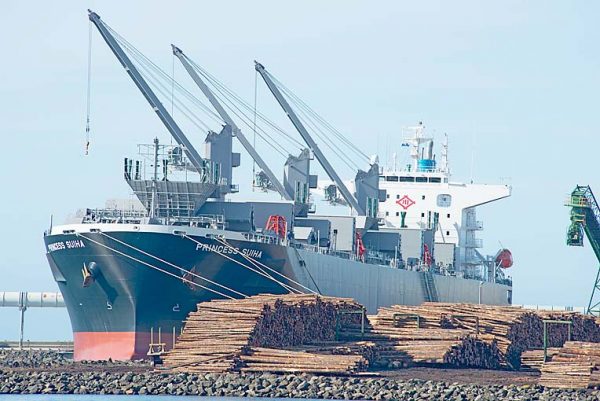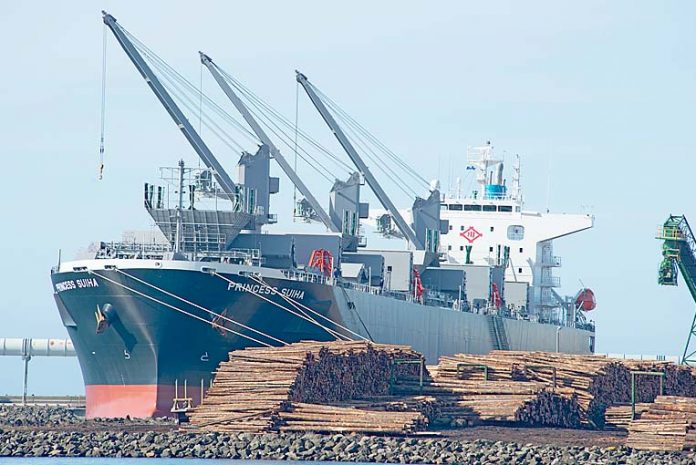
MOUNT Gambier could be losing out on timber industry investments of more than $300m – including the creation of 600 jobs – because of raw log bypassing local processors in favour of Chinese export markets.
Member for Mount Gambier Troy Bell, yesterday warned China’s insatiable demand for raw wood product out of the South East was costing jobs and not about to slow down.
Mr Bell said he had been approached by three separate companies wanting to establish or expand in Mount Gambier over the past 12 months, equating to a potential investment of over $300m, with more than 600 new jobs a real possibility.
“Unfortunately for our community, these companies cannot access any additional wood fibre,” he said.
“We need to prioritise log supply to create local job opportunities.
“Currently there is not a level playing field for local businesses competing for log supply with the export market.
“There are hundreds of jobs that could be created in the South East if exports of raw log were reduced.
“It is time we looked seriously at a 30pc export tariff on logs that are not offered to local manufacturers first in order to grow jobs in the South East and grow our local economy rather than exporting jobs overseas.”
To emphasise his point, Mr Bell said Australia had a $2b trade deficit when it comes to importing sawn wood.
“So in effect we are exporting raw product (log) and importing finished product (sawn wood), costing Australians $2b a year,” he said.
“That is one hell of a lot of jobs that has left Australia.”
Mr Bell’s words were echoed by Regional Development Australia Limestone Coast chair Peter Gandolfi, who called for a 50pc reduction in log exports from the Limestone Coast region.
“I call on forest growers in the region to make 50pc of their current log exports available to the local processing industry first – not only saw log, but also smaller diameter log,” Mr Gandolfi said.
“We need long-term supply contracts from forest growers to secure local processor sustainability.
“Growers should commit to their corporate social responsibilities to bolster the local economy and create jobs.”
Mr Gandolfi said log supply was also important to those who want to enter the local processing market for the first time.
“Without sustainable log supply, new business opportunities cannot be realised in the region,” he said.
“There must be a viable opportunity to further value-add our timber locally.
“I understand the value of the export market to the growers, but their first obligation should be to support our local economy.”
According to Mr Bell, the number of logs being exported from Australia has drastically increased since 2012, with 2017 softwood exports increasing more than 20pc from the previous year to record highs.
He said China had severely restricted logging in its native forests and other countries were imposing tariffs on raw log being exported to China.
“Russia for example has imposed a 25pc export tariff in order to protect local manufacturers, while some districts in Malaysia have completely banned log exports to protect local jobs,” he said.
“Similarly Thailand, Indonesia, Myanmar, Cameroon and Gabon, all suppliers of tropical hardwoods, have imposed log export bans or restrictions, preferring to export higher value sawn wood instead.
“Canada is largely state-owned forests and requires exporters to offer logs to local processors at around 60pc of the export rate.
“Australia and New Zealand are the only countries that provide no protection for local manufacturers.”
Last week, Member for Barker Tony Pasin warned in parliament South East regional timber processors were stymied for growth because of ongoing direct exports of raw logs to overseas processors.
Addressing the House of Representatives, Mr Pasin said prospects for growth in the processing industry in forestry regions were currently limited by the lack of access to domestic log supply – “not because we do not have access to that resource, but because we are exporting that resource in the form of raw logs directly to overseas processors”.
He said last year in the Green Triangle more than 1.7 million cubic tonnes was exported, equating to close to 50pc of national exports.








